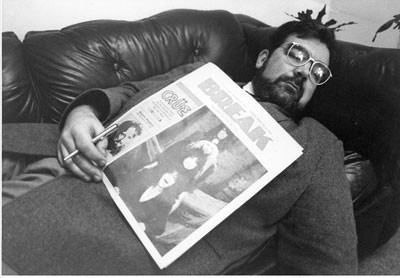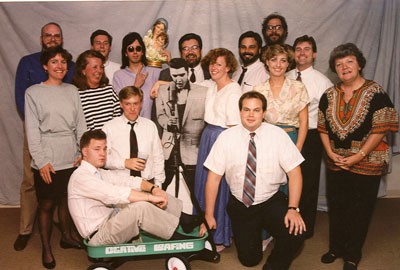Here's a little secret: When this paper started, hardly any of us really knew what we were doing. Creative Loafing had been a presence in Atlanta for 17 years when founder Deborah Eason decided to bring an alternative newsweekly to Charlotte. It was the company's first expansion into another city, and the nuts and bolts of how to do it, more often than not, were up in the air.

- TAKING A BREAK: Former editor in chief John Grooms reacts to an issue of Break, Creative Loafing's "competition" during its first decade
Eason's son Ben was CL-Charlotte's first publisher. He brought the family's experience and expertise to bear on the fledgling publication, but still, this was his first attempt to start a new paper.
Our editorial staff was led by Suzanne Gulley, who, although a veteran of several area papers including the Southeast News in Matthews, was unfamiliar with what alternative newspapers did. She left the paper a year later. And the only previous newspaper experience Associate Editor/Music Writer/Happenings & Soundboard Slave Yours Truly had was writing a column for a college paper back in the Flintstones Era. But, hey, I knew a bunch of people in town, including some good writers, so I was in.
Our sales staff, which included future publisher Carolyn Kamin (now Butler), was untested but, led by Atlanta CL alumnus Scott Brown, their enthusiasm was unflagging, as was everybody's. In fact, that enthusiasm is what held the paper together. There was a sense in the early, founding days of CL-Charlotte that we were doing something this city needed. Truth be told, that kind of faith -- and a dedicated owner -- can take a new publication a long way. So we persevered, we improvised, we learned, and, well, here we are.
After 20 years, it doesn't seem like yesterday anymore, but the memories of the paper's earliest days remain. There we were, settling into our luxurious offices over the plasma center at the edge of the Cherry neighborhood, carefully stepping over the center's clients every morning, raring to go. I remember making a hundred million phone calls to local clubs, galleries, restaurants, bars and organizations, introducing CL to the city, and trolling for Happenings and Soundboard listings, while our rookie sales crew came and went, usually with smiles on their faces. I stayed at work late so many times in those days, a nighttime cleaning lady who often saw me there told me, "You better get home and tend to your wife or you're gonna be like the boll weevil -- you won't have no home." I started going home earlier.
Ms. Gulley and I brought several very good writers on board, all knowledgeable in their fields, and we were off and running. Right off the bat, we found ourselves unexpectedly faced with two competitors: Charlotte Live!, an entertainment tabloid that folded in six weeks, and Break, a Knight Publishing (i.e., Charlotte Observer) magazine whose first issue was on the street one week before CL. (What a coincidence, huh?)
Needless to say, it was often tough competing for ad dollars with a well-financed rival whose primary purpose was to drive us out of business (as a candid Observer editor told me a few months after start-up). One thing, more than anything else, helped CL weather the Observer's challenge: Our writers were very good, their passion showed, and readers responded. Break's bland aura and shallow, "punchy-cute" articles, on the other hand, were never taken seriously as competition for our content, as readers repeatedly told us. We had been right: Readers wanted more than just listings -- they needed some insight and depth to go with them, some meat on the bones. That kind of enthusiastic reader response to the kind of paper we were publishing kept our spirits up through the early financial struggles.
I was a full-time staffer at CL in Charlotte from the day it started in 1987 till late 2005, serving as the paper's editor for all but the first year and the last six months of that sentence, um, time. The only other people who are left today from Day One are publisher Carolyn Butler, and freelance writer/theater critic/man-about-town/king of all media Perry Tannenbaum, whose dedication, integrity, incisive intelligence and stellar writing skills deserve a special shout-out. So, um, that was it.
During our first 10 years, CL was hugely successful in bringing a new, penetrating reporting style to visual arts and theater coverage in Charlotte, introducing the city to its long-ignored local musicians, and offering informed opinions on all of the above. Serious news coverage and investigative reports, though, were hit and miss, due primarily to a shortage of the funds needed to succeed in those more time-consuming fields. As the paper grew, we gained our feet with talented new editorial staffers like Ann Wicker, Vance Cariaga, Matt Brunson and Sam Boykin, as well as experienced contributors like Frye Gaillard and Hal Crowther, and statewide journalism awards began showing up on our walls.
In 2000, Ben Eason and partners bought CL from Ben's mom, Deborah, brought in more resources, upped our circulation, and initiated more intra-paper cooperation among the Charlotte, Atlanta and Tampa publications.
At the first sniff of more money from new owners, I pushed to hire Tara Servatius away from The Leader, a now defunct weekly paper for which she had been garnering notice for her political analyses and hard-nosed reporting. Tara's more conservative leanings drew criticism from some longtime CL fans, and I even lost a couple of liberal friends over her hiring, but many progressive CL stalwarts were won back by her dogged reporting, libertarian instincts, and willingness to point out conservative politicians' foibles. We started going after big guys such as the Charlotte Housing Authority, the county's lax supervision of sewage spills, and the area's flawed evacuation plans, and CL's profile rose in the community.
Even though I was, and remain, proud of our 40-plus statewide, regional and national journalism awards, by 2005 I sorely missed having time to write, and decided to step down as editor to take the more writing-intensive position of senior editor. Six months later, under new editor Mark Kemp, I was let go due to corporate budget cuts. C'est la vie in 21st century America. In any case, I'm still writing for the paper, and have a lot of respect for current editor Carlton Hargro, who has enlivened the paper and pumped new blood into CL's cultural coverage and street presence.

- FAMILY AFFAIR: Early staff members of Creative Loafing, including current publisher Carolyn Butler (far left) and founder Deborah Eason (far right)
CL continues to do well, thanks in large measure to an energetic sales staff. Over the years, their tireless efforts out on the street, one-to-one, have done as much as our editorial content to win over the city.
Out-of-town ownership notwithstanding, CL is a Charlotte paper, staffed entirely by Charlotteans; a paper where writers who are part of the fabric of life in our city write about Charlotte politics, Charlotte music, Charlotte restaurants, Charlotte theater, arts, personalities, and media, keeping readers ahead of the curve of popular tastes.
In the past 20 years, CL has filled various roles: keepers of the local calendar, staunch supporters of quality local music, advocates for the arts, horseflies on the haunches of the self-righteous, reporters of news you won't get elsewhere, a prime source of active, sophisticated readers for advertisers, supporters of the innovative, platform for the progressive, a source of a good laugh or of commentators eager to bring new insights to bear on a variety of issues, and a launching pad for good local writers.
CL has done its best to be a reader-friendly paper, although not in the sense of "dumbing down" the publication, a la daily newspapers. CL has treated its readers the way publications should -- as intelligent people who want to be challenged as often as they're entertained, who aren't afraid of new ideas, new sights, new sounds, and who are willing to see issues from different viewpoints and figure things out for themselves.
The Loaf has been a source of good writing and quality information, speaking to the reader directly and urging readers to talk back as loudly as they want. We had fun, we fought, we made up, and, at least in the editorial department, we never forgot our unofficial motto, "We're not fucking around." (Critics sometimes said our motto should be "Whadda you expect for nothin'," but that's another story.)
CL has brought you the Best of Charlotte issue every year, celebrating the city's finest and funkiest. They've given away more prizes than anyone could keep up with, including trips, stereos, TVs, CDs, clothes, you name it. They've co-sponsored so many events, concerts, festivals and benefits, they've lost count. They've lent help to local arts-related groups. They've helped new musicians get the attention they need to succeed. In other words, CL became members of the community; many readers say the paper has become an essential part of the community, someone you look to for information about what's going on around town, for an insightful viewpoint, for something out of the mundane media mainstream.
In short, CL has offered an alternative.
At the risk of sounding smarmy, we feel a genuine debt of gratitude to all of you, readers and advertisers alike, for letting us survive and thrive. We couldn't have made it without you.
More from CL's past
